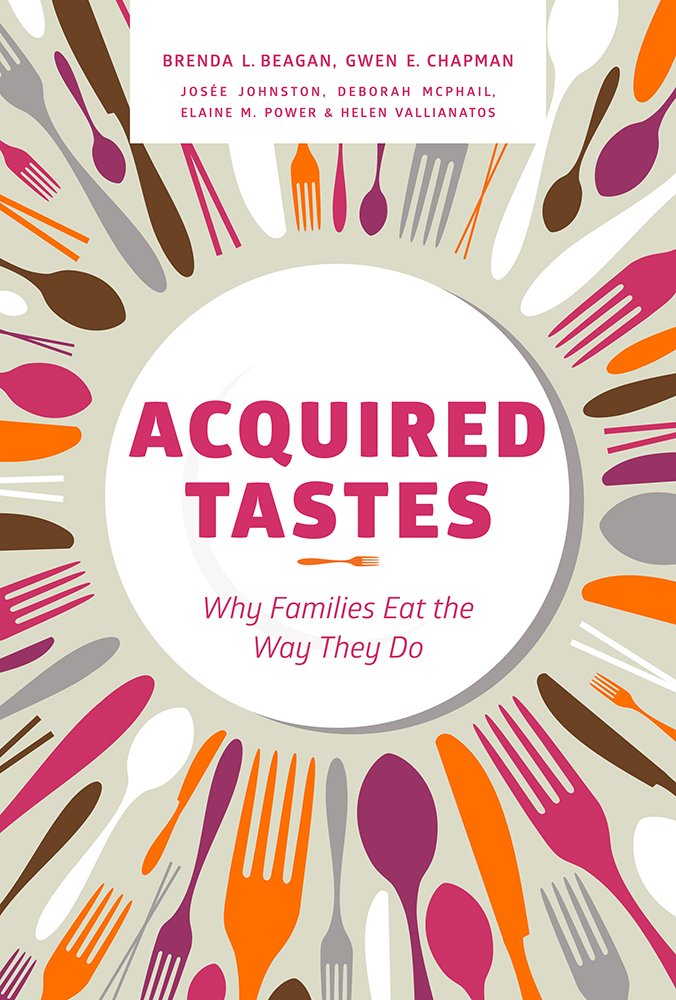News
» Go to news mainIn Conversation with Brenda Beagan: Q&A with the co‑author of "Acquired Tastes: Why Families Eat the Way They Do."
Co-authors Dr. Brenda Beagan (School of Occupational Therapy) and Elaine Power (Queens University) are launching "Acquired Tastes: Why Families Eat the Way They Do" here at �鶹��ý on Thursday, November 19. The book is the result of a study of families across Canada to determine how gender, class and place influence their food choices. In advance of the launch, we sat down with Dr. Beagan to learn more about the study and it's findings.
Why did you decide to study Canadians’ food choices?
I had been working with my co-PI for 10 years, Gwen Chapman at UBC, and both of us had taught food courses. We always found students resisted the idea that food choices are affected by gender, ethnicity, geography, and social class. And we lacked Canadian evidence. So we decided to do the research.
How did you do your study?
We interviewed at least 2 family members (adults and teens) in 105 families in 10 different communities across Canada. Why asked them how they eat and why—and interviewed everybody twice, so we had a lot of data! We asked things like who does the shopping, is there conflict about meals? Then we gave them cameras and asked them to take photos related to their eating, and we asked them about the photos. Then we got them to sort photos we provided into healthy and unhealthy, masculine and feminine foods….it gave us a way of getting at the assumed stuff in a consistent way. We had a picture of a grilled cheese sandwich for example---some people said they liked it as it is. Other people said they would only it if was a special type of bread, and a special type of cheese and a special type of pickle…
 What were your top 3 findings?
What were your top 3 findings?
We pulled out 3 major ways of talking about food: healthy eating, ethical eating and cosmopolitan eating. Social identities, who we are, affect how we use those ways of talking about food: for example it’s not seen as ok for men to talk about dieting—that’s mostly seen as a feminine discussion. But we also use food as a way of positioning ourselves: women, for example, can present an identity of ‘good mother’, a gender identity, through healthy eating and feeding their families ‘healthy’ food. And most people aren’t conscious that we make decisions about food this way.
What are the key implications of your research for public health policy?
I would say the intense messaging around food is that we need more and better nutrition education—our study was aimed at showing people don’t eat just for nutrition—there are many other reasons people choose certain foods, and those are very hard to displace. There’s a lot of social identity wrapped up in food. It’s hard to change behavior that’s not based on conscious knowledge. There’s no point telling people more about the Canada Food Guide if they know it already but don’t follow it because it doesn’t fit with who they are or who they want to show themselves to be.
Have you changed the way you think about doing research as a result of this project?
It was an incredibly collaborative team—it was a wonderful collaborative experience, now when I put teams together I’m very careful. The process of writing a book collaboratively with 6 authors was fascinating and fun…and a lot of work!
Attend the Launch
Thursday, November 19
University Club Pub
4:30 - 6:30
Learn More
Read Dal News - November 18, 2015.
Recent News
- Belief in leadership: New Kinesiology course offers lessons from Lasso
- Two Dal Health graduate students heading to the 3MT finals
- Breaking the cycle: Rethinking substance use, stigma, and social inequities in Canada
- Top 10 Dal Health stories of 2024
- Cards for care: Semester three nursing students collect $1,600 for MOSH
- Master of Health Administration grad continuing cancer research in PhD in Health program
- SWAB‑Rx study aims to expand sexual health services in pharmacies
- Master of Science in Occupational Therapy grad passionate about sustainability in health‑care

